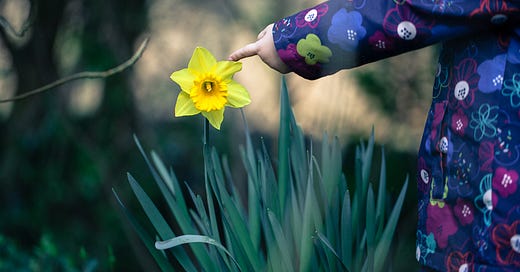This week I’ve felt a powerful urge to share the Easter story with my children. This is quite significant for me since, as the doctrinal crescendo of the Christian calendar, this time of year holds a lot of reminders of religious trauma I’ve chosen to leave behind.
For years, this weekend was fraught with questions about what spirituality meant now that I no longer hold myself personally responsible for Christ’s crucifixion. I’m writing this while my six year old sits across the table from me, drawing a person with purple hair and I can’t imagine telling her that Jesus died because of her wickedness.
Yet part of me still gasps at my own irreverence in writing this. My decisions around faith have often been more heavily defined by what I’m rejecting than what I’m reaching out for because of this inner tug of war. In some ways, it’s been easier to walk away than work out whether the Christian tradition that was such a formative part of my younger life has anything to say to me today.
I’ve been finding myself hungry for a bigger shared story. There are other places to find it but biblical mythology carries particular resonance for me. They’re the stories I know on a cellular level. I used to find that embarrassing but lately it’s reassuring. The people directly in my family line, and the ancestors beyond them, each looked to the scriptures to find what they needed to get through whatever it was they had to get through. They blended them with their own and other stories. In a sense, these are gifts of imagination, sustenance and seeing that they’ve made available to me.
So this Maundy Thursday I found myself reading the story of the last supper and the garden of Gethsemane in the storybook bible that we hadn’t cracked open in years. It didn’t take long for me to feel I needed to censor words or succumb to bigger explanations that broke the flow of the read aloud. I regretted not choosing a version that simply told the story rather than imposing the author’s interpretation, telling the reader what to think.
I try to define “sin” for my children, feeling the sting of it deep in my body, sitting in some long wounded place that still wants to tell me that I am nothing good. Instead I tell them that I understand sin as anything that separates us from love or the divine, including anything that separates us from ourselves. I qualify this because I’m clear that they’re free to see things differently.
One of them asks me why Judas betrayed Jesus. I pause. “To fulfil prophecy”, the answer I would have mostly met growing up, feels like a thought stopper. Instead I point out that there could be lots of reasons and muse that maybe he was disappointed. Jesus had been billed to be this revolutionary figure who was going to throw off Roman rule and it was becoming clear that that wasn’t actually going to happen, that he had something else in mind.
Suddenly, in this exchange, I’m landed with my own message for Easter, the thing from the story that I’d been reaching for. I’ve become well practised at disappointing others recently. It inevitably takes some moving through. Moving through is something that story, particularly these bigger narratives, these wide-stretching, far reaching mythologies can help us do.
Maybe in the past I needed other things from the Easter story, including the permission to ignore it altogether. Today I’m comforted by the figure of Jesus (historically real or not, aware of this themself or not) as a person “of sorrows, acquainted with suffering”, who can identify with making choices that disappoint. Here the gifts of imagination, sustenance and seeing invite me to experience this solidarity at spirit level, to know that disappointment too is part of the cycle, necessary as we mature further into life.




